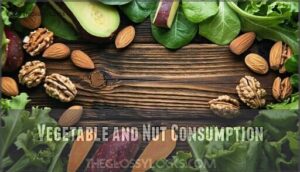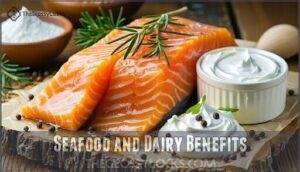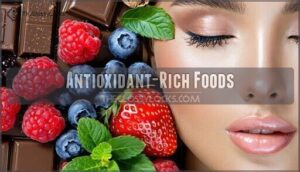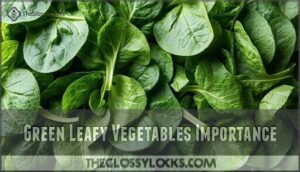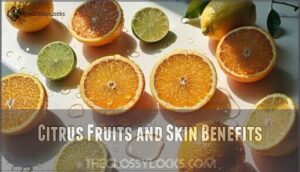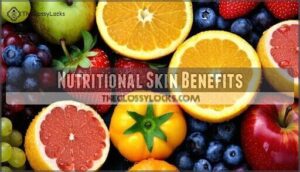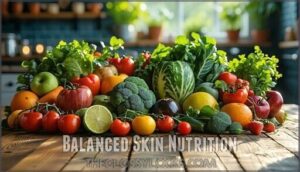This site is supported by our readers. We may earn a commission, at no cost to you, if you purchase through links.
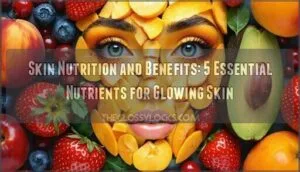
When you fuel your body with vitamin A for cell renewal, vitamin C for collagen production, and omega-3s for inflammation control, you’re basically giving your skin the building blocks it needs to repair and protect itself.
Think of zinc and selenium as your skin’s bodyguards—they fight off damage while keeping everything running smoothly.
You don’t need expensive creams when your plate’s loaded with antioxidant-rich berries, leafy greens, and healthy fats that work their magic from the inside out.
The real secret lies in understanding which specific nutrients pack the biggest punch for your complexion.
Table Of Contents
- Key Takeaways
- Essential Skin Nutrients
- Healthy Diet for Skin
- Skin Protective Foods
- Nutritional Skin Benefits
- Balanced Skin Nutrition
- Frequently Asked Questions (FAQs)
- What is the best nutrition for skin?
- Which nutrient is best for skin?
- What does nutrition do for your skin?
- What is the best supplement for skin?
- How does hydration affect skin appearance daily?
- Can stress hormones damage skin barrier function?
- Does sleep quality impact skin cell regeneration?
- How long before dietary changes improve skin?
- Conclusion
Key Takeaways
- **You’ll get the best results by eating vitamin A, C, omega-3s, zinc, and selenium from whole foods rather than relying on expensive creams or supplements alone.
- **Your skin needs 4-6 weeks to show initial improvements from dietary changes, with more dramatic results appearing after 8-12 weeks of consistent nutrition.
- **You can protect your skin from the inside out by choosing antioxidant-rich foods like berries, leafy greens, and fatty fish while avoiding processed foods that trigger inflammation.
- **You’ll maintain healthy skin by combining proper nutrition with good habits like staying hydrated, getting quality sleep, and managing stress levels.
Essential Skin Nutrients
Your skin needs specific nutrients to stay healthy and look its best.
Feed your skin the nutrients it craves for that healthy, natural glow you deserve.
These five essential vitamins and minerals work together to protect** against damage, support healing, and maintain that natural glow you’re after.
Vitamin a Benefits
Within vitamin A’s skin nutrition benefits, you’ll discover powerful acne treatment and oil regulation capabilities.
This essential skin vitamin accelerates cell turnover, revealing fresher skin while reducing breakouts.
Retinoids, vitamin A’s potent form, deliver impressive anti-aging results by stimulating collagen production.
Topical application can reprogram cellular function, enhancing skin’s overall health and appearance.
Your skin vitamins arsenal isn’t complete without this powerhouse nutrient that transforms skin health from the inside out.
Vitamin C Importance
Vitamin C stands as your skin’s ultimate defender, powering collagen synthesis to keep your complexion firm and youthful.
This antioxidant powerhouse delivers UV protection while brightening dark spots and accelerating wound healing.
You’ll notice improved skin nutrition when you consistently consume vitamin C-rich foods, as this essential vitamin transforms dull skin into a radiant canvas that glows from within.
Many users apply vitamin C serums to enhance their skin, utilizing its anti-aging benefits and promoting a radiant glow.
Omega-3 Fatty Acids Role
Your skin craves omega-3 fatty acids like a plant needs water.
These powerhouse nutrients strengthen your skin barrier, reduce inflammation, and keep your complexion glowing.
Here’s how omega-3s work their magic:
- Fatty fish delivers EPA and DHA directly to skin cells
- Avocado benefits include natural oils that plump skin
- Flaxseeds provide plant-based omega-3 sources
- Inflammation reduction calms irritated, red skin
- Barrier protection locks in moisture effectively
Omega-3 supplementation can lead to noticeable acne reduction after a few weeks.
Zinc and Selenium Functions
Your body’s mineral defense team works around the clock to keep your skin healthy and protected.
Zinc benefits include wound healing and oil regulation, while selenium sources provide powerful antioxidant protection against skin damage.
Deficiency symptoms appear as slow healing and increased sensitivity.
Dosage recommendations vary, but absorption factors like taking zinc with food optimize skin nutrition benefits and overall skin health, ensuring powerful antioxidant protection.
Healthy Diet for Skin
You’ll fuel your skin’s health by eating whole foods rich in vitamins A, C, and essential fatty acids rather than processed junk that steals your glow.
Smart food choices like colorful fruits, leafy greens, nuts, and fatty fish work together to build stronger skin barriers and reduce inflammation from the inside out, which is key to maintaining healthy skin through essential fatty acids.
Whole Foods and Fruits
Each morning, you’re making choices that either nourish or neglect your skin’s needs.
Whole foods packed with Fruit Antioxidants deliver Phytonutrient Power that protects against daily damage.
Fresh fruits provide Natural Sugars for energy while offering Whole Food Hydration your skin craves.
Their Skin-Friendly Fiber supports detoxification, enhancing skin benefits through improved circulation and nutrient delivery for ideal skin nutrition facts.
Vegetable and Nut Consumption
Adding vegetables and nuts to your daily routine delivers powerful skin nutrition benefits through antioxidant power and healthy fats.
Dark leafy greens provide anti-inflammatory compounds that calm irritated skin, while nuts offer vitamin E for hydration. Walnuts contain omega-3s that reduce inflammation, and almonds support UV protection.
Sweet potatoes, a great source of beta-carotene antioxidants, also help. Practice portion control with nuts—a small handful daily maximizes fiber benefits and nutrient absorption without excess calories.
Seafood and Dairy Benefits
You’ll find ocean treasures like salmon and mackerel packed with omega-3s for skin hydration and inflammation control.
Dairy skin benefits include vitamin A for cell renewal and selenium for protection.
Seafood minerals like zinc accelerate healing, while dairy vitamins support your skin’s natural barrier.
These protein powerhouses deliver concentrated skin nutrition benefits that work from within.
Exploring salmon skin advantages can further enhance your dietary approach to achieve skin hydration and inflammation control.
Avoiding Unprocessed Foods
While seafood and dairy provide essential skin nutrition benefits, you’ll want to steer clear of processed foods that sabotage your skin’s health.
These artificial additives and sugar overload create inflammation and accelerate aging.
Here’s what to avoid for better skin nourishment:
- Ultra-processed snacks – They’re loaded with inflammatory oils
- Sugary drinks – They spike insulin and trigger breakouts
- Packaged meals – Sodium bombs that dehydrate your skin
- Artificial sweeteners – They disrupt your gut-skin connection
Start label reading and choose healthy alternatives instead.
Skin Protective Foods
Your skin’s natural defense system gets stronger when you eat the right protective foods.
Antioxidant-rich choices like colorful fruits and vegetables help shield your skin from daily damage while supporting its ability to repair and renew itself, making them a crucial part of your skin’s health, with antioxidant-rich properties.
Antioxidant-Rich Foods
Your skin’s defense against free radical damage starts with nature’s most powerful warriors: antioxidants.
Berries benefits include fighting oxidative stress, while green tea and dark chocolate deliver polyphenol power that shields cells from environmental harm.
These skin antioxidants work overtime, neutralizing damage before it shows up as wrinkles or dullness.
You’ll find skin nutrition benefits multiply when you consistently choose antioxidant-rich foods that support your skin’s natural repair processes.
You can also find antioxidant skin products to supplement your diet.
Carotenoids and Skin Health
Carotenoids offer powerful UV protection through their antioxidant activity, acting like internal sunscreen.
They help prevent sun damage from within, and their presence is signaled by orange and red pigmentation in foods like sweet potatoes, tomatoes, and carrots.
These dietary sources don’t just boost skin nutrition benefits; they actually help prevent sun damage from within, supporting healthy skin pigmentation.
Your body converts beta-carotene into vitamin A, delivering impressive skin antioxidants that enhance overall skin health benefits.
Green Leafy Vegetables Importance
Powerhouse greens like spinach, kale, and arugula pack your plate with vitamins A, C, and K that work overtime for your skin.
These leafy champions deliver chlorophyll benefits while serving as a natural hydration source, supporting collagen boost and detoxification support with sunburn protection properties.
- Spinach – Contains folate and iron that promote healthy cell turnover and oxygen delivery to skin tissues
- Kale – Rich in vitamin K and antioxidants that help reduce inflammation and support natural healing processes
- Swiss chard – Provides magnesium and potassium that maintain skin’s moisture balance and cellular function
Citrus Fruits and Skin Benefits
When you’re craving natural vitamin C and collagen boost benefits, citrus fruits deliver antioxidant power that strengthens your skin’s defenses.
These vibrant fruits provide UV protection while promoting skin brightening through their impressive skin nutrition benefits.
| Citrus Fruit | Vitamin C Content | Skin Benefits |
|---|---|---|
| Orange | 70mg per fruit | Collagen synthesis support |
| Grapefruit | 88mg per half | Enhanced skin brightening |
| Lemon | 31mg per fruit | Natural antioxidant power |
| Lime | 20mg per fruit | UV protection boost |
| Tangerine | 26mg per fruit | Improved skin texture |
These skin food benefits translate into real skin care nutrition that your complexion craves daily, offering collagen synthesis support and UV protection through the antioxidant power of citrus fruits.
Nutritional Skin Benefits
When you nourish your skin with the right nutrients, you’ll see noticeable improvements in how it looks and feels.
Your skin becomes more resilient, hydrated, and youthful-looking as these essential vitamins and minerals work together to support your body’s natural repair processes, making it look and feel more youthful-looking.
Improved Skin Appearance
When you fuel your body with the right nutrients, your complexion transforms in remarkable ways.
Proper skin nutrition benefits create visible improvements that’ll make you wonder why you waited so long to prioritize your diet.
Here are 5 ways nutrition enhances your appearance:
- Skin Radiance – Antioxidants create that natural, healthy glow from within
- Even Tone – Vitamins reduce dark spots and discoloration effectively
- Texture Refinement – Essential fatty acids smooth rough, bumpy skin
- Acne Reduction – Zinc and selenium minimize breakouts and inflammation
- Youthful Glow – Collagen-supporting nutrients maintain firmness and elasticity
Reduced Skin Aging
Your skin’s appearance improves dramatically when you nourish it properly, but the real magic happens at the cellular level where aging begins.
Antioxidant Power from berries and green tea fights free radicals that cause wrinkles, while Collagen Boost nutrients like vitamin C maintain skin structure. Cellular Repair accelerates through omega-3s, supporting skin elasticity and skin rejuvenation processes that keep you looking younger.
Emerging research highlights the importance of safe retinol practices for effective skin renewal.
| Nutrient | Skin Aging Benefit | Food Source |
|---|---|---|
| Vitamin C | UV Protection + collagen synthesis | Citrus fruits, tomatoes |
| Omega-3s | Hydration Levels + inflammation reduction | Fatty fish, flaxseed |
| Skin Antioxidants | Free radical defense | Berries, honey |
Skin nutrition benefits compound over time—your consistent choices today determine tomorrow’s reflection.
Enhanced Skin Barrier
Your skin barrier acts like a fortress wall, defending against environmental damage while locking in moisture.
Ceramides boost this protective layer, maintaining lipid balance that’s essential for skin protection.
Essential fatty acids from your diet support barrier repair, strengthening skin hydration naturally.
When you nourish your skin from within, you’re building resilience against daily stressors and pollutants.
Increased Skin Hydration
Beyond proper water intake, you’ll boost skin hydration through electrolyte balance and humectant foods like honey and oats.
These hydration methods support your skin barrier while maintaining ideal skin moisture.
Try pairing these skin hydration tips with moisturizing techniques—your complexion will thank you for the extra attention to skin nutrition benefits.
Balanced Skin Nutrition
You need the right balance of nutrients to support your skin’s natural repair and protection processes.
When you consistently choose nutrient-dense foods over processed options, you’re giving your skin the building blocks it needs to stay healthy and resilient.
Daily Nutrient Intake
Getting the right amounts matters more than you might think. Your skin thrives when you consistently meet daily targets for key nutrients. Think of it like feeding a garden – timing and portions make all the difference.
A daily supplement intake can also help meet nutritional needs.
- Optimal Servings: Aim for 5 servings of fruits, 3 servings of vegetables, and 2 servings of nuts daily
- Hydration Levels: Drink 8 glasses of water to support nutrient absorption and skin moisture
- Supplement Timing: Take vitamins with meals for better absorption and reduced stomach upset
Skin-Friendly Food Choices
Transform your plate into a skin nutrition powerhouse by prioritizing colorful, whole foods that support both gut health and radiance.
Choose probiotic foods like yogurt and fermented vegetables alongside prebiotic foods such as garlic and oats to enhance your skin’s natural glow.
Make smart hydration choices with water-rich fruits while considering allergy considerations when introducing new skin-friendly options.
Consistent skincare can maintain the skin’s pH for better results, supporting overall radiance and gut health.
Avoiding Harmful Substances
While choosing skin-friendly foods matters, you’ll also want to dodge the troublemakers that sabotage your glow.
Processed foods and added sugars trigger inflammation, while alcohol effects include dehydration and nutrient depletion.
Smoking impact accelerates aging through collagen breakdown, and environmental toxins in skincare products contain harmful chemicals.
Following these skin nutrition tips and skin protection advice helps you avoid substances that undermine your skin care efforts.
Maintaining Healthy Skin Habits
Beyond avoiding harmful substances, your daily habits play a major role in supporting skin nutrition benefits.
Consistent skincare routine, proper sun protection, and quality sleep create the foundation for healthy skin habits.
Your skin wellness depends on these key practices:
- Hydration habits – Drink water throughout the day to maintain your skin’s natural moisture barrier
- Stress management – Practice relaxation techniques since chronic stress can trigger breakouts and premature aging
- Sleep quality – Aim for 7-9 hours nightly when your skin repairs and regenerates itself
Frequently Asked Questions (FAQs)
What is the best nutrition for skin?
Want gorgeous skin that glows? You’ll need vitamins A, C, D, E, plus zinc and omega-3s from whole foods.
Fill your plate with leafy greens, citrus fruits, nuts, and fatty fish while avoiding processed junk.
Which nutrient is best for skin?
Vitamin C stands as your skin’s top champion, driving collagen production while fighting UV damage. You’ll find it in citrus fruits, berries, and leafy greens—nature’s anti-aging powerhouse.
What does nutrition do for your skin?
People who consume at least five servings of fruits and vegetables daily show 25% better skin quality.
Nutrition fuels your skin’s repair, collagen production, and protection against damage, delivering essential vitamins and antioxidants that keep you glowing naturally, with nutrition being key.
What is the best supplement for skin?
There’s no single "best" supplement since everyone’s skin needs differ.
Vitamin C supports collagen production, while omega-3s reduce inflammation.
Zinc helps with healing and oil control.
You’ll get better results combining supplements with a nutrient-rich diet.
How does hydration affect skin appearance daily?
Your skin acts like a thirsty sponge—proper hydration plumps cells, smooths fine lines, and creates that healthy glow you’ll notice within hours of drinking enough water daily.
Can stress hormones damage skin barrier function?
Yes, stress hormones like cortisol can seriously weaken your skin’s protective barrier.
When you’re chronically stressed, these hormones disrupt lipid production and reduce natural moisturizing factors, leaving your skin vulnerable to irritation and dehydration.
Does sleep quality impact skin cell regeneration?
Beyond thinking it’s just about beauty sleep, quality rest directly controls your skin’s nightly repair cycle.
During deep sleep phases, your body ramps up cellular regeneration and collagen production while you’re catching those essential Z’s.
How long before dietary changes improve skin?
You’ll typically notice initial improvements in 4-6 weeks, with more significant changes appearing after 8-12 weeks of consistent nutritional adjustments and healthy eating habits.
Conclusion
Like a well-oiled engine needs the right fuel, your skin thrives when you consistently feed it the right nutrients.
Understanding skin nutrition and benefits isn’t just about looking good—it’s about creating lasting health from within.
You’ve got the roadmap now: prioritize vitamin A, C, omega-3s, zinc, and selenium through whole foods rather than supplements alone.
Your skin’s transformation won’t happen overnight, but with consistent nutritious choices, you’ll notice that healthy glow becoming your new normal.
- https://www.healthylooks.com/the-role-of-nutrition-in-skin-health-eat-your-way-to-glowing-skin/
- https://lpi.oregonstate.edu/mic/health-disease/skin-health
- https://www.environskincare.com/vitamin-a/what-does-vitamin-a-do-for-your-skin/
- https://www.muktiorganics.com/en-us/blogs/news/vitamin-a-for-skin-5-benefits-and-how-to-use-it
- https://www.healthline.com/health/beauty-skincare/vitamin-a-for-skin


